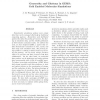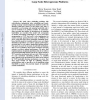874 search results - page 157 / 175 » On Advantages of Grid Computing for Parallel Job Scheduling |
WSC
2007
13 years 10 months ago
2007
We describe the spatial Agent-Based Computational Laboratory that we have developed to study the pandemic influenza risks of US cities. This research presented a series of interes...
EUROPAR
2009
Springer
13 years 11 months ago
2009
Springer
Abstract. In the field of HPC, the current hardware trend is to design multiprocessor architectures that feature heterogeneous technologies such as specialized coprocessors (e.g., ...
HPDC
2005
IEEE
14 years 1 months ago
2005
IEEE
Biomolecular simulations produce more output data than can be managed effectively by traditional computing systems. Researchers need distributed systems that allow the pooling of...
IPPS
2010
IEEE
13 years 5 months ago
2010
IEEE
We study three scheduling problems (file redistribution, independent tasks scheduling and broadcasting) on large scale heterogeneous platforms under the Bounded Multi-port Model. I...
EAGC
2003
Springer
14 years 24 days ago
2003
Springer
Application layer networks are software architectures that allow the provisioning of services requiring a huge amount of resources by connecting large numbers of individual compute...


